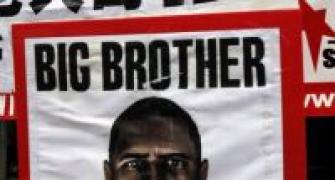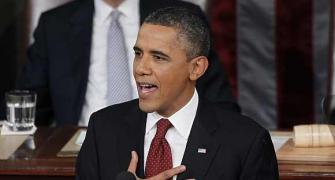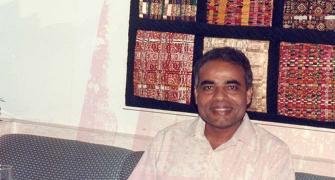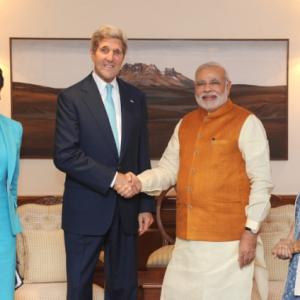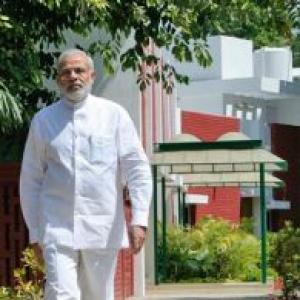 There was no breakthrough in US Secretary of State John F Kerry’s India visit, but no breakdown either, says C Uday Bhaskar.
There was no breakthrough in US Secretary of State John F Kerry’s India visit, but no breakdown either, says C Uday Bhaskar.
United States Secretary of State John F Kerry’s just-concluded visit to India unfolded along predictable lines. There was no major breakthrough on any of the bilateral issues that have been in different stages of stasis since late 2008, but to the credit of both sides the much anticipated breakdown has been belied.
Over the last year, beginning with the controversy over the denial of a visa to Indian Prime Minister Narendra Modi when he was still chief minister of Gujarat, the Devyani Khobragade episode, the snooping revelations and now the deadlock over the trade facilitation agreement, there were many areas of dissonance and divergence.
Without any fanfare, Foreign Minister Sushma Swaraj and Secretary Kerry made what may be described as the first amicable political contact as far as the Modi government and the Obama administration are concerned. Exuding a business-like approach, they reiterated their political commitment to a frayed bilateral, and identified the potential agenda for the meeting between the two principals in late September this year.
Kerry visited India in June 2013 in what was his first visit as secretary of state -- after the Hilary Clinton baton was passed to him -- and at the time he noted that US President Barack Obama had qualified the friendship between the two nations as ‘one of the defining partnerships of the 21st century.’
At the time, the United Progressive Alliance II led by Dr Manmohan Singh was distracted by a range of turbulent domestic issues and was on its last lap. On the other side, Obama II was also caught in bitter political contestation and India had fallen off the White House’s radar.
In the past year there has been a major political transition in India and while the US appears to have been less than prepared for the decisive electoral victory of the Modi campaign, it appears that India is getting back into focus and this augurs well despite the bleak contours that envelop the spectrum of bilateral issues.
US-India relations have been estranged for almost three decades plus -- from 1974 during the Indian peaceful nuclear explosion -- and it was only in the Atal Bihari Vajpayee period that the beginning of rapprochement was discernible. The economic liberalisation under P V Narasimha Rao and the strategic profile and related credibility that India acquired post-May 1998 provided the foundation for the holistic review of the bilateral relationship under the Bush administration.
The radical June 2005 civilian nuclear agreement was finally realised in late 2008 after a torturous ‘down-to-the-wire’ closure that then Senator Kerry was deeply involved in. The fractured political support in Delhi for the US-India bilateral relationship is well known, and has been most recently alluded to by former Indian foreign minister K Natwar Singh in his forthcoming book.
The continuity in the macro-policy towards India from the Republican Bush team to the Democratic Obama White House was evident in the manner in which Secretary Kerry responded to the media in Delhi at the joint press conference July 31.
He was candid in observing that while the US and India can and should be indispensable partners for the 21st century, ‘Delivering on the potential of this moment is the key. The words are easy. It is the actions we need to take that will really define the relationship in the days ahead.’
Sushma Swaraj was equally expansive and yet pragmatic when she identified the areas covered -- security, energy, trade and investment, science and technology, regional and global issues -- and added: ‘The extent to which our cooperation has an impact on the wellbeing of our people, our economies, and our respective regional and global interests makes ours a truly defining partnership. And the extent to which revitalised India-US ties contribute to peace, security and prosperity of our neighborhood, the Asian region and beyond, makes our relationship truly strategic. We recognised that today both sides stand at an important turning point.”
The potential and the pitfalls to the bilateral were acknowledged in a satisfactory manner and the fact US Defence Secretary Chuck Hagel will be in Delhi on a three-day visit from August 7 will add to the agenda that will be outlined in the Modi-Obama meeting in September.
There is an instructive political contrast to the forthcoming US-India summit meeting. When Prime Minister Singh met with President Obama, the latter was in the ascendant as a new president and the Indian leader appeared beleaguered and domestically constrained. Now the Indian prime minister brings a distinctive political dynamism and purpose while the White House looks jaded and distracted with major challenges looming -- both internationally, and in the zero-sum cauldron of US domestic politics.
Swaraj and Kerry have outlined the preliminary content for the homework that the officials have to do on both sides over the next 60 days to come up with a meaningful and doable agenda so that the Modi-Obama meeting in September is more substantive than what previous US-India summits have been. This bilateral sure needs vikas (progress).
Image: US Secretary of State John Kerry holds a chair for Foreign Minister Sushma Swaraj as they arrive for a joint press conference in New Delhi on July 31, 2014. Photograph: Vijay Verma/PTI Photo.
C Uday Bhaskar is Distinguished Fellow, Society for Policy Studies, New Delhi.

